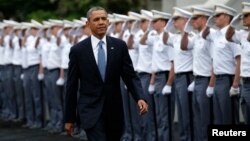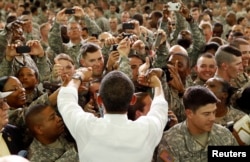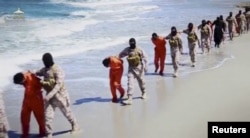With a presidential election just six months away, Americans appear deeply divided over the role the United States should play in the world, according to an opinion survey by the Pew Research Center.
"Considerable apprehension and concern" are the words researchers used to describe the mood of the American public regarding how the country fits into the current world order.
A summary of the Pew study, "America’s Place in the World," posted on its website, puts it this way:
"In fact, most Americans say it would be better if the U.S. just dealt with its own problems and let other countries deal with their own problems as best they can."
In a certain light, the findings support President Barack Obama's governing principle, expressed in coarse language, regarding U.S. foreign policy during his first term: “Don’t do stupid [stuff]."
Now, seven years later and as the end of Obama's two terms in office draws near, the Pew Center research shows how public opinion has shifted in the aftermath of the U.S. invasion of Iraq and the country's declining military involvement in Afghanistan.
Seven years later, most Americans agree that the U.S. “should concentrate more on our own national problems.” Fewer concur with this sentiment than was the case in 2013 — 69 percent now, 80 percent then.
But that was one year before the rise of the Islamic State group, or ISIS, the brutal Islamic extremists whose tactics include beheading hostages, enslaving women and demanding absolute obedience to the most rigid interpretation of the Quran.
Here are some of the major findings of the survey, compiled just before Senator Ted Cruz and Governor John Kasich suspended their presidential campaigns, leaving frontrunner Donald Trump a open path to win the Republican Party's 2016 nomination for president.
— Nearly half (46 percent) say the United States is a less powerful and important world leader than it was 10 years ago, while 21 percent say it is more powerful and 31 percent say it is about as powerful as before.
— 35 percent of respondents say the United States should increase military spending, but 24 percent say it should be cut. Forty percent say it should be kept about the same as today.
— Trump questions U.S. membership in NATO, but Americans overwhelmingly view NATO membership as beneficial for the United States, with 77 percent saying it's a good thing for the country.
— Most Republicans (74 percent) say their bigger concern is that the U.S. will not go far enough in its efforts to stop Islamic militants in Iraq and Syria, while just 23 percent are worried that the U.S. will go too far and become too involved in the situation there.
A majority of Democrats (57 percent) share that concern that the U.S. will go too far militarily.
Read the full survey here.














